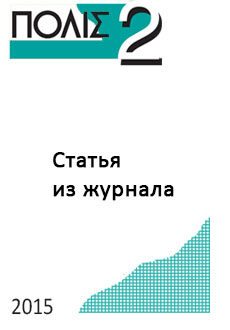Online shop of "Polis. Political Studies" Journal
We in the world, the world in us
Vasileva V.M., Vorobyev A.N. Corruption Markets. – Polis. Political Studies. 2015. No 2. P. 78-96.
Free!
Authors develop a new conceptual approach to the corruption studies and effectiveness of anticorruption regulations of public service. Basing our hypothesis on the study of effective models of conflict of interest regulation, authors assume that there is a “missing factor” in the modern corruption studies. This “missing factor” is a “corruption market”, particularly, its size, type and nature. Conflict of interest regulations’ aim at controlling key channels of corruption behavior, and corruption market in its turn determines prevailing channels of existing corruption behavior. Thus, misidentification of corruption market’s type is the main reason for the failure of anti-corruption policies, no matter how new and effective models are imported. Corruption market’s size is defined as the number and average price of corruption deals. The nature of corruption market depends on the side, setting the final price of corruption deal. Resulting from institutional characteristics of public administration, corruption markets are either seller’s or buyer’s type. Seller’s corruption markets are sensible to the ethic regulations of the public service, and the only effective way of tackling buyer’s corruption markets are “cut-red-tape” reforms and compliance-based regulation of conflict of interest. Type of corruption
market encompasses 3 dimensions: quality of institutions, scope of regulations and degree of regulations. Basing on the introduced model, authors identify and analyze 8 types of existing corruption markets. Each type of corruption market has its own transformational dynamics and, consequently, own opportunities for
anti-corruption policies. A new conceptual model of corruption market evolution is introduced in the article. Transformations of corruption markets depend on several factors. The key factors are personalization of political regime, “new public management” reforms of public administration, populist policies and creation of rentier states, and set up of the Welfare State.
 English
English Русский
Русский

Reviews
There are no reviews yet.